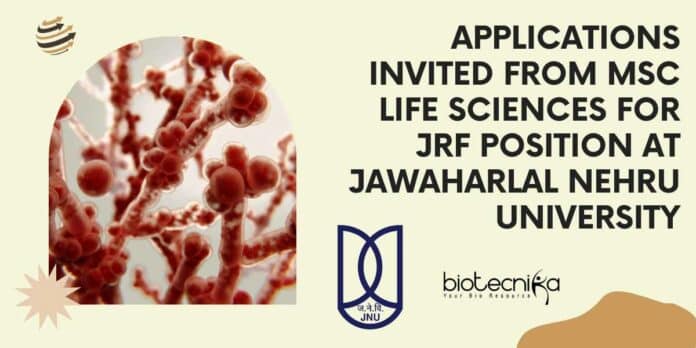JRF Position for MSc Candidates at Jawaharlal Nehru University
JRF Position for MSc Candidates at Jawaharlal Nehru University – Applications Invited. Applications Invited From MSc Life Sciences For JRF Position at Jawaharlal Nehru University Interested Candidates Check out the details below and Apply Online
This job expires in
School of Life Sciences,
Jawaharlal Nehru University,
New Delhi – 110067
Applications are invited for one post of “JRF” to work in a STARS-sponsored project entitled “Epigenetic regulation and its inhibition as a mechanism to block GPI anchor biosynthesis in C. albicans”.
Job Title: Junior Research Fellow (JRF)
Project Title: “Epigenetic regulation and its inhibition as a mechanism to block GPI anchor biosynthesis in C. albicans”.
The advertised post is temporary and is co-terminus with the project ending in February 2024.
How to Apply:
Applications only on plain paper giving full details of qualifications/ experience should reach by email only to
Dr. Rohini Muthuswami
School of Life Sciences,
Jawaharlal Nehru University,
New Delhi – 110067
Email id: [email protected]
The last Date to Apply: 30th August 2023.
Minimum qualification: Candidate should have M.Sc in any branch of Life Science with at least 55% marks. Candidate should have lab experience
of at least 1 year. Candidate should know molecular biology techniques including protein purification.Salary: Rs 31,000/- + HRA.
Here are five potential interview questions along with their sample answers :
1. Question: Can you elaborate on your experience in molecular biology techniques and protein purification, as mentioned in the job advertisement? Answer: Certainly. During my M.Sc program in Life Sciences, I actively participated in laboratory courses and research projects that involved various molecular biology techniques. I gained hands-on experience in DNA extraction, PCR, gel electrophoresis, and plasmid purification. Additionally, I was involved in a project where I successfully expressed and purified a recombinant protein using affinity chromatography. This experience not only enhanced my practical skills but also deepened my understanding of the underlying principles of these techniques.
2. Question: Could you discuss your one-year lab experience and how it has prepared you for this JRF position? Answer: Absolutely. Over the past year, I’ve been involved in a research project focused on studying gene expression patterns in response to environmental stressors. This experience has allowed me to work with cell cultures, conduct RNA extractions, perform qPCR analyses, and contribute to data interpretation. Additionally, I’ve gained valuable insights into experimental design, troubleshooting, and maintaining meticulous records. This hands-on exposure to lab work has provided me with a strong foundation that aligns well with the requirements of the JRF position.
3. Question: How familiar are you with the concept of GPI anchor biosynthesis in C. albicans, and how do you envision your role in this STARS-sponsored project? Answer: I am well-acquainted with the concept of GPI anchor biosynthesis in C. albicans through my coursework and personal research interests. I understand that GPI anchors play a crucial role in cell surface integrity and virulence of this pathogenic fungus. As a potential candidate for this project, I foresee myself actively contributing to deciphering the epigenetic regulation of GPI biosynthesis. My background in molecular techniques and lab experience positions me well to assist in experiments related to gene expression analysis, epigenetic modifications, and protein purification to explore the mechanisms underlying GPI anchor biosynthesis.
4. Question: Can you discuss your motivation for applying to this JRF position and how it aligns with your career goals? Answer: I am enthusiastic about joining this project because it aligns perfectly with my academic and career aspirations. I’ve always been fascinated by the intricate molecular mechanisms governing biological processes. This JRF position provides an excellent opportunity to delve deeper into the field of epigenetics and its role in fungal biology. Moreover, the chance to work at a renowned institution like Jawaharlal Nehru University and contribute to a project with real-world implications for pathogenicity and drug development greatly appeals to my long-term goal of pursuing a research career focused on molecular biology and its applications.
5. Question: How do you plan to manage the challenges associated with a temporary project that ends in February 2024? Answer: While the project’s temporary nature presents challenges, I see it as an opportunity to make a focused and impactful contribution. I believe effective project management and time allocation will be key. I plan to ensure that I am well-versed in the project’s objectives from the outset, allowing me to swiftly integrate into the team and maximize my productivity. I’ll maintain open communication with my colleagues and supervisor, regularly updating progress and seeking guidance when needed. This proactive approach will help me stay on track, contribute meaningfully, and complete the project’s objectives within the given timeframe.
Editor’s Note: JRF Position for MSc Candidates at Jawaharlal Nehru University. Please ensure you are subscribed to the Biotecnika Times Newsletter and our YouTube channel to be notified of the latest industry news. Follow us on social media like Twitter, Telegram, Facebook






























